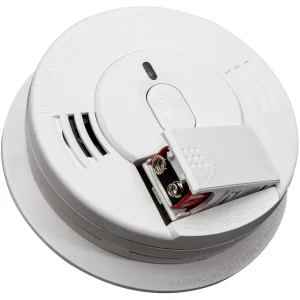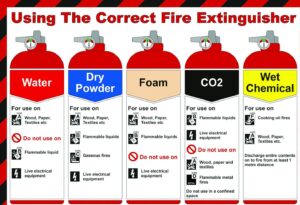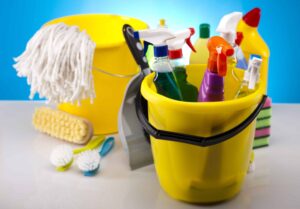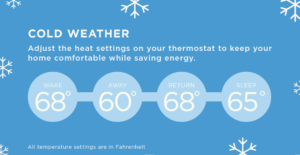Why a Yearly Safety Inspection?
Inspecting a property before you rent or buy makes sense so you know what you are getting into. At move-out, especially with rentals, inspecting again informs both landlords and tenants of any changes in the condition of the rental due to wear or damage. But what about doing an inspection yearly? Why would you need to go to that kind of bother? The reason is to make sure your safeguards are in place and working properly and to find any potential problems before they become big problems.
Smoke Alarms and Carbon Dioxide Detectors

Batteries run down. A yearly (or twice yearly) check is a good idea to make sure these devices are working properly. Most have a test button that makes a noise if they are functional. Some also will beep when the battery is starting to die. These are potentially life-saving devices so making sure they work is vital. You should also have a smoke detector in or near each room and a CO2 detector on each level. A general guideline is to have a smoke detector for each bedroom and each level of your home.
Extinguishers
Another life (and property) saving device is a fire extinguisher. If you have one, have you ever checked it to make sure it is functional? Over time, they can lose pressurization. Make sure the pressure gauge is still in the green. Dry chemical extinguishers should be gently shaken monthly to keep the powder from settling. Check for dents or damage to the device. Extinguishers 6 years or older may need to be recharged. Many also expire after 12 years and should be replaced. Additionally, make sure you have one accessible in or near every potential danger area such as a kitchen, garage, or area where you frequently have candles.

Plumbing
Leaks usually start small. A yearly inspection is a great way to find small problems before they become big ones. You may not be able to check all of the plumbing in an apartment building but you can check your area. Look around toilets and tubs for leaks. Watch for water damage on floors and walls. Check under sinks for drips that could develop into floods. You will also want to check for moisture and mold in items you store near water sources. Those are often your first signs of trouble. If your fridge has an ice maker, you will need to inspect the water line for damage.
Electrical
Check around your plugs for damage. Look for burns or cracks and sniff to see if you smell anything weird. Contact your landlord right away if any of the outlets or appliances are not working or you notice potential problems. Sparking wires can be a source of residential fires. Also, check any cords for cracks and make sure extension cords and power strips are not overloading the circuit they are on.
Chemicals
Many common household cleaners are toxic, especially when combined. For instance, household bleach mixed with ammonia or acidic toilet bowl cleaners will create a toxic fume that can cause lung injury or death. It is dangerous to use them at the same time or store them in the same place. Make sure you have adequate ventilation when you are cleaning and avoid breathing any potential fumes. Don’t mix any products you are unsure about. Chemical burns and toxic gasses are avoidable with some simple precautions.

Furnaces and Water Heaters
Changing furnace filters may be something your landlord does or something you are responsible for. Check your rental agreement or talk to your landlord to determine your responsibility. Dirty furnace filters impede airflow and cut down on efficiency which can cost you money. Furnaces should be serviced yearly by a qualified HVAC service. When was yours done last? You should also inspect your water heater for any cracks or leakage. Over time, sediment builds up in the tank. This should be removed yearly to keep your water heater in working order. Again, check with your landlord and alert them to any problems you find during your inspection.
Cracks and Leaks
Buildings settle over time. This may be more noticeable after a wet year. Cracks can occur in foundations and walls as buildings shift. Freezing and thawing can cause damage to water lines and septic tanks. Watch your water bill and if you notice the number of gallons used increase rapidly over what you think you used, you could have a leak in the water line. Toilet tanks may also start leaking. A quick way to tell is to put non-toxic dye in the tank. If it starts to show in the bowl without flushing first, you probably have a leak. These are usually pretty easy to fix but can be costly over time if not addressed.
A yearly inspection will help you find little problems so you can fix them before they become big problems. You will protect your personal property and could potentially save lives by attending to some simple maintenance issues. Choose a date and complete your inspection yearly. Like checking smoke alarms with each change from daylight savings to standard time and back, you can set a yearly (or more often) reminder to keep your family safe. As always, good communication with your landlord or property manager will facilitate timely repairs and maintenance. If you are looking for a place to rent in Durango CO, consider checking with The Property Manager. We can help you find just what you need.
Resources:
https://www.safenow.org/how-many-smoke-detectors-do-i-need/
https://fire-extinguisher-guide.com/how-often-should-you-shake-a-fire-extinguisher/
https://www.thoughtco.com/common-household-chemicals-dangerous-mixtures-607722
https://www.rent.com/blog/things-to-look-out-for-during-an-apartment-inspection/
https://safetymanagement.eku.edu/blog/10-most-common-causes-of-house-fires/
https://www.usfa.fema.gov/downloads/fief/up_in_smoke_home_checklist.pdf
https://www.rentecdirect.com/blog/safety-checklist-for-rental-properties/



